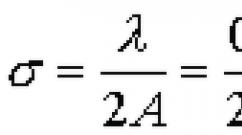John Davison Rockefeller is the first billionaire in history and the richest man in the world. John Rockefeller - biography and success story
Greetings! I think each of us has "dark" days when we feel like a complete loser and a failure. And the thought: "why strain, it still won't work," knocks out of the saddle and makes you drop your hands.
There are a lot of remedies for seizures "everything is gone": meet old acquaintances, watch videos with kittens, find a new hobby. But personally, an easier way always helps me: success stories famous people... Greatly motivates and inspires! If they succeed, then maybe I should give up too early?
Most recently, John Rockefeller played the role of my "antidepressant" whose biography more resembles a science fiction novel than life an ordinary person... And the most impressive moments I included in today's post.
The future billionaire was born in a large family Protestants in the town of Richford (USA) in 1839. By the way, Rockefeller's nationality is not a Jew at all, as many believe. 🙂
From early childhood, he kept in a notebook (!) And. He did not spend his first savings ($ 50) on sweets, but lent it to a neighbor-farmer at 7.5% per annum. At that time, young John was only ... thirteen.
John Davison Rockefeller Sr. took his first job at the age of 16 after completing a three-month accounting course. He was hired as an assistant accountant in trading company for a salary of ... $ 17 per month. The guy quickly climbed career ladder... And after some time he was already appointed manager with a salary of $ 600.
John's first work is interesting in two ways. First, he quit his job as manager after learning that the previous chapter was paid almost three times as much. Secondly, the job in that trading company was the first and ... only Rockefeller job for hire.
In 1857 he became a business partner for a small English entrepreneur. Moreover, the young Rockefeller borrowed the missing amount for the partnership from his father. Clark & Rochester specialized in the sale of meat, grain and hay. Interestingly, when they needed a loan for business development, all negotiations with banks were conducted by young John!
Rockefeller and oil
John Rockefeller was one of the first to assess the prospects of the oil business. In 1870, he creates the legendary oil company Standart Oil, which will bring him a billion-dollar fortune in the future. In order not to depend on anyone, Standart Oil carried out a full cycle: from the extraction of crude oil and its processing to deliveries to the end consumer.
By the way, it was he who first introduced a non-standard motivation system at the enterprise. Part of the employees' salaries were paid not in “real” money, but in Standart Oil, which was constantly growing in price.
For 10 years, Rockefeller's company has become an absolute oil monopoly in the United States: 95% of all production in the country. John dealt with his competitors ruthlessly. Dumping on the cost of railroad transportation, he forced other oil companies to leave the market or ... merge with Standart Oil.

By the way, I really liked the book on oil: “Extraction. The World History struggle for oil, money and power " Daniel Ergin. Highly recommend!
Hard monopoly was not to the liking of anyone other than Rockefeller. Therefore, in 1890, the Sherman Antitrust Act was passed in the United States, which dealt a crushing blow to oil empire billionaire. In 1911, he had to split Standart Oil into 34 companies. True, the controlling stake in each of them was retained by the former owner of the corporation.
John Rockefeller died at the age of 97 in 1937, bequeathed his fortune to his son: John Davison Rockefeller Jr. By the way, it was the son of the legendary billionaire who built the famous Empire State Building in New York and the UN headquarters.
- In terms of the current dollar rate, Rockefeller's fortune at the time of his death was $ 310 billion. Until now, it is he who is considered the richest man in modern history.
- He owned not only the legendary Standart Oil, but also 16 railway and 6 steel companies, nine real estate funds, six shipping companies, nine banks and even three orange groves.
- During his life, the billionaire donated about $ 100 billion to charity. Most of this money went to research medicine. In the late 30s of the last century, a group of scientists from Oxford received a grant of $ 5,000 from the Rockefeller Foundation. As a result of research ... penicillin was discovered.
- In 1917, Rockefeller's fortune corresponded to 2.5% of the US GDP.
- V Everyday life the richest man in the world was a real ascetic in food and clothing, he did not smoke or drink alcohol.
- Married to his wife Laura Spelman Rockefeller lived for over 60 years! The spouses understood each other perfectly and, according to family friends, were the perfect couple.
- Rockefeller is said to have created a micromodel at home. market economy... His daughter Laura was appointed CEO, and all the children had to fill out the ledgers. A day of abstinence from sweets was estimated at 2 cents, and each subsequent day was already at 10 cents. The billionaire's children received payment for weeding in the garden, sharpening pencils, music lessons, chopping wood and ... killed flies. For being late to the table, they were fined 1 cent.
- Rockefeller's son confidently followed in his father's footsteps. During the years of the First and Second World War, he earned about $ 2 billion in net profit for military needs
- Standart Oil employees scared their children with Rockefeller (like we are Baba Yaga).
 to postpone the first step towards your goal. There are no valid excuses
to postpone the first step towards your goal. There are no valid excuses
And the biographies of what great people inspire you to feats? Subscribe to updates and share links to fresh posts with your friends on social networks!
John Davison Rockefeller is an American entrepreneur who made his fortune by starting from scratch. He founded Standard Oil, which took the leading position in the American economy and made its founder the richest man in the world.
Rockefeller was born on July 8, 1839, in Richford, New York, and when he was 16 he and his family moved to Cleveland. He was not afraid hard work, and, as a teenager at the age of 16, was looking for work in various small firms... His first job was as an assistant accountant at small company Hewitt & Tuttle, dealing with wholesale trade(bought goods to sell for a commission) and traded in vegetables for export.
At the age of 20, Rockefeller, who was doing well in his job, decided to start his own business with another business partner, engaged in the wholesale of hay, meat and other goods. At the end of the first year of operation of his company, its gross profit Rockefeller was very careful and thoughtful, tried in every possible way to avoid unnecessary risks, but in the early 1860s he noticed that there was an opportunity to open an oil business due to increased demand for oil. And in 1863 he opens his first refinery near Cleveland. Less than 10 years later, Rockefeller, the founder of Standard Oil, almost completely controlled all the country's refineries.
Standard Oil
As the oil business moved east to Pennsylvania, Rockefeller followed. By the early 1880s. he held a dominant position in the oil business throughout the country, and net worth his company was $ 55 million. Standard's leadership position was due to the fact that it was closely associated (or owned) with almost every side of the business. Under the leadership of Rockefeller, the company created its own pipeline system for transporting products. She had her own wagons for transportation, and she also bought thousands of hectares of forest for fuel.
In 1882, Rockefeller founded the Standard Oil Trust, a trust company that would serve as a model for other types of monopolies. Naturally, Rockefeller was appointed head of this company.
But while Rockefeller's power and wealth grew, his reputation in society deteriorated. In the early 1800s, the state began enforcing antitrust laws, paving the way for the Sherman Act, which went into effect in 1890.
In 1895, 56-year-old Rockefeller retires from his daily involvement in the affairs of Standard Oil and focuses on charity work... But the new leadership could do little to suppress attacks on Rockefeller and his business.
In 1904, Ayda Tarbell wrote The History of Standard Oil, a book full of condemnation, in which she told the story of Standard Oil's ruthless business practices. In 1911, the corporation was disbanded under the influence of the Sherman antitrust law.
Subsequent years
John Davison Rockefeller has invested a lot in charity. Collectively, he donated $ 530 million in various ways. His money helped found the University of Chicago, also known as Medical Institute named after Rockefeller (later Rockefeller University) in New York, and as the Rockefeller Foundation.
His wife Laura and Rockefeller had five children, including their daughter Alice, who died in infancy.
Rockefeller died on May 23, 1937, Ormond Beach, Florida. However, his legacy lives on to this day: Rockefeller is considered one of America's leading businessmen, whose achievements influenced the formation of the nation as it is today.
John Davison Rockefeller is the richest man in the world in the history of mankind.
The future billionaire was born on July 8, 1839 in Richford, New York State. Both parents, William Avery Rockefeller and Louise Selanto, were members of the Baptist Church. The family had six children, of whom John was the second oldest. William worked as a traveling salesman and from childhood brought up the ability to trade in children. To do this, his father paid John to do household chores. During the periods of William's departure, the mother, who did not work anywhere, but was engaged only in housekeeping, had to save money, and Louise instilled this ability in her offspring.
The world's first billionaire John Rockefeller
Little John showed commercial ingenuity from an early age - he sold sweets to his sisters, which he bought in bulk. And at the age of 7, the boy hired a neighbor on a farm, where he earned his first money by picking potatoes and raising turkeys. From the very first days working life Rockefeller kept an accounting book, where he neatly entered income and expenses.
Young John impressed those around him as a quiet, pensive boy. The lean and unemotional child thought for a long time and was in no hurry to make a decision. But in fact, John was a very sensitive boy, and he was experiencing the loss own sister who died as an infant. After the girl's death, John lay prone on the grass away from home for 12 hours.

At school, Rockefeller did not like to study, although the teachers noted the boy's tenacious memory and the ability to think logically. During his studies, John started a usurious business. Rockefeller realized that by lending small amounts at low interest, you can earn money without difficulty. The boy did not want to become a slave to money and work for a salary day and night, John decided to make money his own slaves and make them work for himself. After graduating from high school, John became a student at a commercial college, so the young businessman took a three-month accounting course, where he mastered the necessary basics of money management.
Business
In 1855, John took the first and only hired job at Hewitt & Tuttle in the accounting department. The young man started out with a salary of $ 17, but after a few months the young man was promoted to $ 25. A year later, Rockefeller was appointed manager of the company. John began to receive a salary 20 times more than an accounting salary. But the ambitious young man was not satisfied with this amount, since the previous leader was paid much more and, without having worked for a year, John quit to start his own business.
In order to become a partner of a businessman from the UK, Rockefeller had to borrow $ 1200 from own father at 10% per annum. Having collected the required 2000 dollars, Rockefeller became a partner and owner of shares in the firm "Clark and Rochester". The company traded in agricultural products. Rockefeller quickly gained the trust of partners with business acumen, intuition and sincerity. The young man took up the financial affairs of the enterprise.

In the second half of the 19th century, the development of a new market area - the oil refining business - began in America, since kerosene lamps began to be popular in everyday life. John Davison Rockefeller invites practicing chemist Samuel Andrews to cooperate and makes the scientist a partner of the new Andrews & Clark firm. Clark's previous partner did not want to participate in such a business, and John had to buy out a stake in the company and take over the management of the business.
At 31, Rockefeller creates Standard Oil, which is engaged in a full cycle of kerosene production, from oil production to the sale of finished products. The peculiarity of doing business was that John did not pay salaries to employees in cash. The businessman gave out an incentive with shares of the enterprise. This approach allowed workers to work with greater responsibility, since now the well-being was directly dependent on the success of the company.

Rockefeller's business development proceeded at a rapid pace. Due to his entrepreneurial spirit and the ability to negotiate with influential people, John achieved for his own company reduced prices for freight railroad... Compared to competitors, Standard Oil products were transported 2-3 times cheaper. Rockefeller thus forced other oil companies to sell production to Standard Oil. Thus, the enterprising businessman became a monopolist.
In 1890, Senator Sherman's antitrust law was passed in the United States, which was directed against the activities of the Standard Oil company. Rockefeller was forced to split production into 34 controlled enterprises for 20 years. In each of them, John secured the right to own a controlling stake. This division of the business had a positive effect on the tycoon's capital, Rockefeller multiplied his own income.
State
The annual income of John Rockefeller from the activities of the Standard Oil company was $ 3 million. At the time of his death, according to experts, the state of the oil tycoon was $ 1.4 billion. The company owned 70% of all world oil fields... In terms of the current dollar exchange rate, this is $ 318 billion, or 1.5% of the GDP of the United States. Rockefeller owned 16 railway companies, 6 steel-making plants, 6 steamship enterprises. The businessman owned 9 banks, 9 real estate firms.

Rockefeller at the end of his life surrounded himself with luxury, but did not advertise this to society. The tycoon's family owned orange groves, villas and mansions, a land plot of 273 hectares. John Rockefeller's favorite game was golf, so the billionaire had a playing field for his personal use. The tycoon explained his own well-being by discipline and maintaining the 12 golden rules of life that John had developed in his youth.
Charity
John Rockefeller attended the Protestant church from childhood and, as an exemplary Christian, from the very first earnings began to donate tithing for the needs of the parish he attended. The oilman did not change his own habit until the end of his life. The tycoon donated $ 100 million. In addition to donating to the church, Rockefeller did a lot of charity work. John donated money to the University of Chicago, New York Institute for Medical Research, of which John was the creator. In the early 20th century, Rockefeller created the Council for General Education and the Rockefeller Foundation.
 Tycoon John Rockefeller in 1885
Tycoon John Rockefeller in 1885 The oil tycoon wrote a number of biographical books, the first of which was the 1909 edition of Memories of People and Events. In 1910, Rockefeller's book, How I Made $ 500,000,000, was published about the history of enrichment. In 1913, the entrepreneur wrote the book "Memoirs", in which he outlined all Interesting Facts own biography.
Personal life
At the age of 25, John Rockefeller married teacher Laura Celestia Spelman from a wealthy family. The girl attracted the groom with her piety. The young people were united by a mutual feeling of love for each other and outlook on life and family well-being. Both were extremely economical and unpretentious in desires.

The Rockefeller family had 4 daughters and the only heir was the son of John D. Rockefeller Jr., who became the successor of his father's business. Even when Rockefeller acquired the Cleveland oil refinery, the family continued to live in rented housing and did not keep a servant. As the oil tycoon himself wrote, John owes his commercial success to his wife.
After the death of his wife, John Rockefeller lived for a long time. The oilman fell in love with female society and gradually got used to wearing expensive suits. Rockefeller's favorite headdress was the straw hat, in which the elderly entrepreneur often posed for a photo.

John raised children in an original way... Each child had a ledger in which they recorded cash rewards and expenses. In the Rockefeller house, there was a certain system of rewarding children for work. John rewarded his daughters and son for their refusal of any benefits. For example, for a day without sweets, the child was entitled to a sum of money.
John D. Rockefeller Jr. increased the fortune of the family corporation many times over. And five grandchildren, the most famous of whom were Nelson, Winthrop and, participated in the political and economic life USA until the beginning of the 21st century.
Death
John Rockefeller had two dreams in life that did not come true: to live to the age of 100 and earn $ 100 thousand.But death caught the entrepreneur at the age of 97, and his fortune was $ 192 billion.John Rockefeller died on May 23, 1937 from a heart attack in Florida ...
Quotes
Notable quotes from the oil tycoon:
Whoever works all day has no time to earn money;
Your well-being depends on your own decisions;
If your only goal is to become rich, you will never achieve it.
12 Rockefeller rules
- Work less for people. The more you do not work for yourself, the sooner you get poorer. The word "work" has the root "slave".
- The right way to save money is to take a step towards success. Buy products where it is cheaper or in bulk, prepare a list of what you need in advance, purchase products according to the list.
- If you are poor, start doing business. If you don't have a penny at all, then you should open a business right now, without delaying even a minute.
- The road to success, the road to huge wealth goes through passive income.
- Dream of earning at least $ 50,000 a month, and possibly more.
- Money comes to you through other people. Communication, benevolence makes people rich. An uncommunicative person rarely becomes rich.
- A poor environment, unsuccessful people pull with them - into poverty and to failure. You need to surround yourself with winners and optimists.
- Do not make up an excuse for yourself to postpone the first step towards achieving your goal - there is none.
- Explore the biographies and thoughts of the world's richest and most successful people. The life story of a successful person will help fulfill the desires of everyone - this is the meaning of this quote.
- Dreams are the main thing in your life. The main thing is to dream and believe that dreams will come true. A person begins to die when he stops dreaming.
- Help people not for money, but out of your heart. Give 10% of your profits to charity. That is, each person should help those in need. This is evidenced by the success story of John D. Rockefeller.
- Create business systems and enjoy your earned money. The meaning of this quote is that a person should work in order to live happily, and not stupidly accumulate wealth.
John Rockefeller is an American entrepreneur and multimillionaire.
Rumor has it that the wives of the workers scared their children: "Don't cry, otherwise Rockefeller will take you!" The paradox was that the richest man in the world was most proud of his impeccable morality.
John Davison Rockefeller was born on July 8, 1839 in the state NY... His mother, an ardent Baptist, was engaged in his upbringing.
Doing business was part of the family's upbringing. Also in early childhood John bought a pound of candy, divided it into small piles, and sold it to his own sisters at a premium. At the age of seven, he sold the turkeys he raised to his neighbors, and he lent the $ 50 earned on this to a neighbor at seven percent per annum.
It is almost impossible to judge what Rockefeller really was: he subordinated all his soul movements to one goal - to get rich.
The future millionaire never finished school. At the age of 16, after completing a three-month course in accounting, he began looking for work in Cleveland. He got a job as an assistant accountant at the Hewitt & Tuttle trading company. It is said that from the first salary, Rockefeller acquired a ledger, where he recorded all his expenses. He kept this little book all his life.
Incidentally, this was John's first and last job for hire. At the age of 18, he became a junior partner of the merchant Maurice Clarke.
Partners supplied flour, pork and salt to the troops during the Civil War. Soon oil was found in Pennsylvania, and Clark and Rockefeller took up it. As a result, Rockefeller bought his share from a partner for 72 and a half thousand dollars. In 1870, he created Standard Oil, collecting oil production and refineries into a single oil trust. Rockefeller presented competitors with a choice: union with him or ruin. They acted with the dirtiest methods. The company used industrial espionage to gather intelligence about competitors and market conditions.
After 9 years of creation, Standard Oil controlled 90 percent of the refining capacity in the United States.
In 1890, a law was passed aimed at combating monopolies. Rockefeller managed to bypass this law for a long time. But in 1911, Standard Oil was split into 34 companies.
Rockefeller was married to Laura Celestine Spelman. She had a practical mindset. Rockefeller once remarked: "Without her advice, I would have remained a poor man."
Biographers write that Rockefeller did his best to accustom children to work. He created a kind of model of a market economy at home: he appointed his daughter Laura "director" and told the children to keep detailed accounting books. Each child received money for different actions.
In 1917, Rockefeller's personal fortune was estimated in the modern equivalent at $ 150 billion. It still remains the richest man in the world. Rockefeller's donations for his life exceeded $ 500 million.
For financiers, Rockefeller's biography is a role model, because he was the richest man of the 20th century. Having gone from an accountant to a corporation owner, Rockefeller made a fortune with big amount zeros. At the same time, John was an example not only in financial prosperity, but also in charity.
Birth
Rockefeller's biography begins in 1839, when he was born in the city of Richford. William, the father of the future millionaire, worked in different areas: lent money, traded timber, etc. Due to his inclination to take risks, he managed to put together a small capital ($ 3100), part of which was spent on the purchase of a land plot. The other part William prudently invested in several enterprises. He told little John about his investments, explaining the specifics of doing business.
First earnings
John Rockefeller, whose biography will be discussed in this article, made his first money at the age of 7. He raised turkeys for sale and dug up potatoes from neighbors. John recorded all his income in a small notebook. Having saved up $ 50 by the age of 13, the future oil tycoon lent them to a farmer at 8% per annum. At the age of 16, after completing courses in accounting, he went in search of work. Six weeks of searching were unsuccessful. Finally John got a job at Hewitt and Tuttle as an assistant accountant. Working 16 hours a day, Rockefeller quickly established himself as a professional, and soon he was offered the vacant managerial position. True, they paid three times less than his predecessor. John quit ... It was the first and last time when he was employed.

Own firm
Further, the biography of Rockefeller leads us to 1857, when the future oil tycoon opened a joint business with Maurice Clarke. Partners were lucky: it broke out Civil War with the southern states. The US government needed tons of biscuits, tobacco, sugar and meat, as well as hundreds of thousands of rifles, uniforms, and millions of cartridges. To fulfill these orders, the start-up capital was not enough, and John decided to take out a loan. The likelihood of refusal was high, but Rockefeller went to the director of the bank and frankly told everything. Sincerity young man impressed the banker and the loan was approved.
Standard Oil
John Rockefeller's history as an oil tycoon began in 1865. At that time, everything was covered and kerosene itself was obtained from oil. John immediately realized the prospects of this business and got involved in its production, opening the Standard Oil Company. When the business began to generate income, Rockefeller began to buy up others. oil companies... By 1880, thanks to numerous mergers, Standard Oil owned 95% of the oil production market. Didn't even change the situation. The millionaire simply split Standard Oil into 34 small firms, each of which he owned a controlling stake.

Charity
Rockefeller's biography is filled not only with financial victories. He is the largest philanthropist in the history of America. At the beginning of the twentieth century, John handed over business management reliable partners, and he himself was engaged only in charity work. In 1905, he donated $ 100 million to the church, and at the end of his life gave away more than half a billion.













